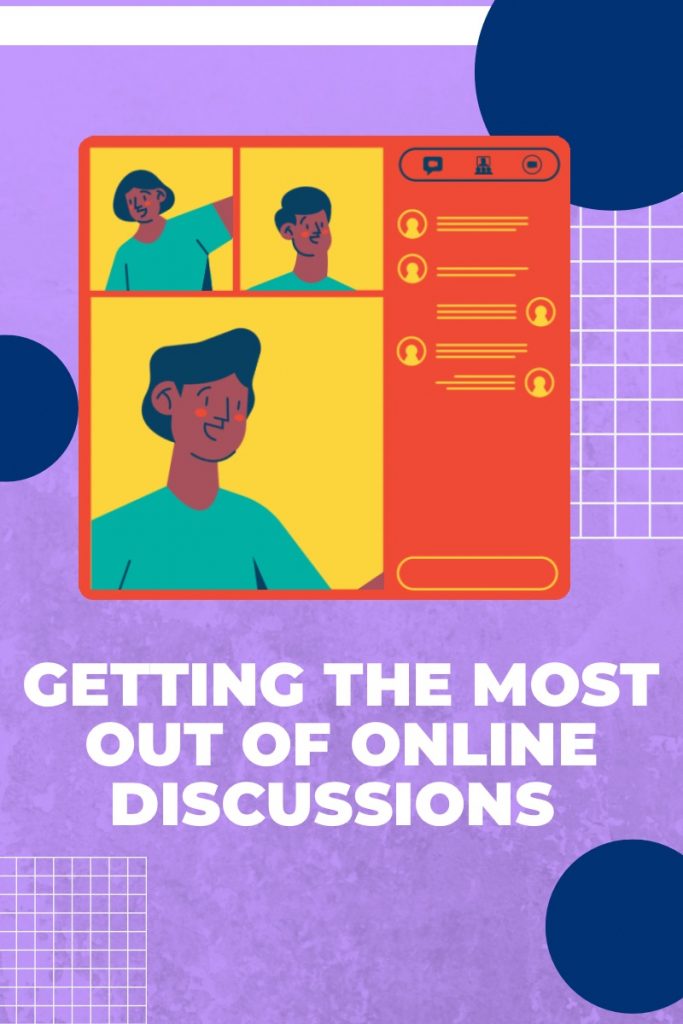“Discussions are essential for engagement, connection, and allowing faculty to share expertise and knowledge with students. When done well, it’s similar to a discussion faculty facilitate in an in-person environment,” Sheila Fry, COO of The Babb Group, explains. We all know how even in-person discussions can be uninteresting, and learners tune out. There are ways we can promote engagement both online and in person. In this article, we’ll discuss why discussions can be an engaging part of a class, when to use them, and suggest ideas for how to use them effectively.
Why discuss?
As Fry notes, discussions promote a connection between learners. These conversations go beyond memorizing facts to interpreting and analyzing information and applying it to lived experiences. When you have well-crafted discussion prompts, they can foster collaboration and sharing and support content delivery.
Online discussions allow learners to practice supporting their opinions with scholarly resources in stark contrast to the discourse on social media. To accomplish this, instructors need to model appropriate academic discussion.
How to use discussions
Fry suggests discussions go beyond typical assignments. She says, “Discussions shouldn’t be viewed as an assignment. They are constantly evolving and changing as the week progresses.” Fry suggests creating open-ended discussions on the topics for the week. Here are example prompts:
Describe two ways you can apply what you learned about machine learning to the organization you are researching for your final project.
After watching the video on conflict, explain a scenario from your personal or professional life where you can transform conflict into an innovative idea.
Using this week’s readings, share one of your experiences applying adult learning theory to online education. Be specific. Include one example of how you use this theory to create relationships with students.
How to Create Discussions Where Students Actually Discuss
Online discussions are a vital element of student engagement in online courses. But many of these discussions could be more effective because they never move past the superficial answer-this-prompt-then-comment-on-peer approach. Try these approaches to promote critical thinking in initial posts and responses.
- Using case studies or real-world scenarios helps students apply course concepts beyond the classroom.
- Use topics/prompts with more than one correct or no right answer. Ask students to provide examples from their lives.
- Use the discussion to share assignments and do peer evaluations.
- Provide students specific questions or prompts for the peer responses.
- Include responding to peers as part of their grade and in the rubric. Students will not spend time on the responses when responding to peers is not worth points.
Facilitating the Discussion
Encourage peer-to-peer interactions. Facilitating a discussion does not mean dominating it. Instructors can clarify concepts, ask further questions, and encourage students to connect. Sometimes this means the instructor should step out of the way.
“Faculty engagement is critical for success in a discussion. That doesn’t mean responding to everyone. It’s more about testing the waters, letting the students take the lead, and jumping in at various points to clarify a point, redirect the discussion, offer examples, and reinforce learning. Doing this will keep a discussion interesting throughout the week,” explains Fry.
The instructor also helps set the tone early in the course and creates a safe environment. Set an example with your responses and questions to peers. In the first few discussions, give students feedback about your expectations for their answers’ tone, citations, and quality.
Set an example if you want students to use various tools to post and respond in the discussion board. If you expect a video post or response, create one. This way, students are clear about expectations. Plus, you can experience any technical challenges they may face and provide instructions or links to mitigate issues.
Grading Discussions
Set clear expectations in the rubric for what criteria earn students points. If you require APA citations, indicate that in the rubric. Provide students with an example post and response to model your expectations. If you expect students to add media to their posts, include instructions. Define when initial posts and responses to peers are due.
We want to hear from you! Share your best practices and experiences with online discussions with us in the comments.
Angela
Latest posts by Angela (see all)
- The Art of Connection: Networking and Professionalism in Academia - July 25, 2024
- Got the Teaching Job? Now, You Need To Attend the Faculty Training - July 1, 2024
- Higher Education Trends: Insights from Our COO, Sheila Fry - June 20, 2024
